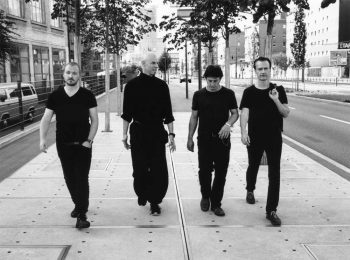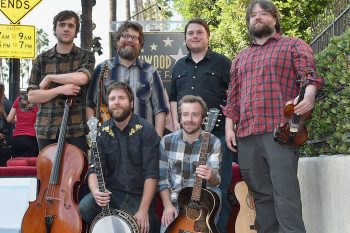By Denny Dyroff, Entertainment Editor, The Times
An often-heard phrase makes the claim that “less is more.” Sometimes, it makes sense — other times not.
The phrase definitely makes sense when it’s used in reference to the music made by Nik Bärtsch.
The music composed and performed by Bärtsch with his various ensembles is minimalistic — and full — at the same time.
Bärtsch, a pianist, composer and producer who was born and still resides in Zürich, Switzerland, began studying piano and percussion when he was just eight years old.
After attending high school at Musikhochschule Zürich, Bärtsch studied philosophy, linguistics and musicology at the University of Zürich.
His rich musical resume includes ongoing work on his Ritual Groove Music as pianist and composer and leading both the ensemble Mobile and the zen-funk quartet Ronin.
Bärtsch is an instructor for “Practical Aesthetics” at the Musikhochschule Zürich/Winterthur, co-founder of the music room Club EXIL in Zürich and founder of the label Ronin Rhythm Records, a platform for creative groove music. One of his main interests is the influence and the combination of music and movement, especially in the following body techniques — Aikido, Feldenkrais, and Gyrotonic.
On May 8, Bärtsch will bring his group Ronin to Philly to perform at the World Café Live (3025 Walnut Street, Philadelphia, 215-222-1400, www.worldcafelive.com). Ronin is turning in support of its new album “Awase,” which was recently released on ECM Records.
“As a kid, I had a fascination with rhythm,” said Bärtsch, during a trans-Atlantic phone interview last week from his home in Zürich.
“I liked to drum on things, I told my mother I would like to play drums. It was hard to get it at school because they said drums were not an instrument for kids.
“Then, I saw a young guy playing piano – playing boogie-woogie music on piano. That’s what I wanted to do. At that time, there were no jazz teachers at my school, so my mother got another private teacher for me. I stayed on drums but piano became my main instrument. I decided to focus on piano in a classical context.
“I also learned about singing – learning from the use of voice to work in movement with brass. I never sang in public but singing influenced me in phrasing – and moving my body while playing instruments. I learned more about body movement from Akido. Movement became very essential. I played the way singers moved.
“When I finished at the University of Zürich with a piano diploma, I had to learn to find my own way. At the university, I also studied philosophy and linguistics. I was always interested in improvisation – people like Gershwin – and then the minimalists. I played minimalistic music but missed the larger sound. I tried more and more to combine that.”
Bärtsch began work in three distinct formations. The group Mobile plays purely acoustic music, performed in rituals of up to 36 hours, including light and room design. The Zen-funk quartet Ronin, by contrast, is more flexible and plays the compositions more freely. As a solo performer, Bärtsch performs his compositions on prepared piano with percussion.
According to Bärtsch, “‘Ritual Groove Music,’ which is the title of my first CD, also points to the fundamental concept of my musical thinking. The music shows a close affinity to architecturally organized space and is governed by the principles of repetition and reduction as well as by interlocking rhythms.
“A piece of music can be entered, inhabited like a room. It moves forward and transforms through obsessive circular movements, superimposition of different meters and micro-interplay. The listeners attention is directed toward minimal variations and phrasing. The band becomes an integral organism — like an animal, a habitat, an urban space. One must think with ears and hands.
“Despite the tightly organized compositional construction, improvisation plays an important role in our music. On the one hand, accentuation, ghost notes, and variations within a composition are tossed back and forth between the musicians. On the other hand, a particular voice within a composition might have more freedom than the others.
“In doing so, that voice forms an independent module that can interact with the strictly notated interlocking patterns in continuously changing ways. Groove-habitats or void musical space of raw poetry emerge.
“My thinking and music are based on the tradition of urban space. They are not distilled from a national or stylistic tradition but from the universal sound of cities. The city in its roaring diversity requires an ability to focus and concentrate on the essential — to measure one’s actions, to remain silent at the right place. This music draws its energy from the tension between compositional precision and the self-circumvention of improvisation. From self-implied restriction stems freedom. Ecstasy through asceticism.”
Bärtsch’s “weltanschauung” (German for “view on life”) is apparent on his new album “Awase.”
“Awase”, a term from martial arts, means “moving together” in the sense of matching energies. It is a fitting metaphor for the dynamic precision, tessellated grooves and balletic minimalism of Bärtsch’s Ronin. Bärtsch speaks of a new-found freedom and flexibility in the approach to the material, with “greater transparency, more interaction, more joy in every performance”.
“We recorded ‘Awase’ in October at Studios La Buissonne in the south of France in October 2017 and it was produced by Manfred Eicher,” said Bärtsch. “It’s the same studio as other Ronin albums. We really took our time. We found a direct, immediate flow in the studio.”
Ronin’s music consistently follows the same aesthetic vision under various instrumental guises — creating the maximum effect by minimal means.
Despite the wide variety in the band’s influences, Ronin’s music always possesses a strong individuality. The talented musicians incorporate elements of disparate musical worlds – including funk, new classical music and sounds from Japanese ritual music – and meld them into a coherent new style.
“It’s a big challenge,” said Bärtsch. “But, we are happy when the music slowly seduces you. The whole process was quite long. Some pieces are from five years ago. Every Monday, we play live at my Club EXIL in Zürich when we’re not out on tour. We check out new pieces there first. In the end, we get results that are complex but not complicated.”
Bärtsch will conclude his stateside tour on May 10 in Chicago. Then, he will return to Switzerland in time to see his favorite football (soccer) team F.C. Zürich (hopefully) defeat Young Boys in the championship final of the Swiss Cup on May 27 at Letzigrund Stadion in Zürich.
Video link for Nik Bärtsch’s Ronin — https://youtu.be/hjtPj8F-SKM.
The show at the World Café Live will start at 8:30 p.m. Tickets are $27.
Another interesting show in Philadelphia on May 8 will take place at PhilaMOCA (531 North 12th Street, Philadelphia, 267-519-9651, www.philamoca.org) when the garage-pop band Varsity headlines a show at the Center City venue.
Varsity — Stephanie Smith, Lead Vocals, Synth; Dylan Weschler, Guitar, Backing Vocals; Patrick Stanton, Guitar; Paul Stolz, Bass Guitar; Jake Stolz, Drums – is a promising young indie band from Chicago. The group is touring in support of its new album “Parallel Person,” which was just released on April 27 via Babe City Records.
Varsity formed in 2013 when several Chicago musicians gathered for a “salon night” party where friends shared stories and songs.
“Back in 2013, Dylan and I were playing together,” said Stanton, during a phone interview Monday morning from a tour stop in New York City. “We were covering songs by other artists. Our friend Steph hosted a party for friends to play music or do poetry.”
Smith liked the sound of the two guitarists/friends and invited them to perform with her. The trio soon became a quintet — adding brothers Jake Stolz on drums and Paul Stolz on bass. A short while later, the band began playing shows around Chicago.
“Our first show as Varsity was at a friend’s party on fall of 2013,” said Stanton. “Our first paid gig came about a month later at Quencher’s – a club in Chicago.”
Varsity released a song on its Bandcamp page in 2013 titled “Turns Out,” with a B-side titled “Downtown.” In April 2014, the band self-released its first EP, “Thanks for Nothing.”
“We recorded our first EP in the basement of Steph’s parents’ home,” said Stanton. “It took us four days to make it. Between then and the release of the new album, we had this idea to release digital singles and we did that over the course of as year.”
The singles, all self-released, were “Smash/Still Apart” (2016), “Eye to Eye/Kelly” (2016), and “Cult of Personality/So Sad, So Sad” (2015).
“We recorded six tracks that we released two at a time,” said Stanton. “That helped us hone our craft. We’d put the single up and get immediate feedback. The whole process was very beneficial.
“We recorded ‘Parallel Person’ with producer Dave Vettrain last June in Chicago. We spent eight days tracking at Mimball Studio and then spent a month mixing it.
“Our sound has evolved over the years. We’ve gotten a lot better about being concise with our ideas. We don’t meander as much as we used to. And, we’re playing better with each other – playing good poppy melodies.
“In our live show, we’re playing a lot of the new songs. And, we definitely have a few old staples and singles in our set. But, we’re focusing on the new album with seven or eight of the songs in the show.”
Video link for Varsity — https://youtu.be/zf0biqPdkHY.
The show at PhilaMOCA on May 8, which also feature Boose Gumps and Jelani Sei, will start at 8 p.m. Tickets are $12.
Taylor Phelan, a Texas-born singer/songwriter/guitarist, has performed in Philadelphia twice in recent years this decade – once with his former band and, more recently, as a solo act.
Now, Phelan and his two touring sidemen are returning to the area to perform a show on May 9 at MilkBoy Philadelphia (1100 Chestnut Street, Philadelphia, 215- 925-6455, www.milkboyphilly.com).
“The first time I played Philadelphia was with my old band The Canes,” said Phelan, during a phone interview Monday afternoon as he travelled from a date in Nashville to a gig in Washington, D.C.
“We played a house party at Temple University. Then, I came back after the Canes disbanded and did a show on my own at Kung Fu Necktie.”
When Phelan takes the stage at MilkBoy Philly, he will be joined by keyboardist Conner Giles and drummer Jake Gillespie.
“We used to travel with a five-piece band,” said Phelan “I scaled it down to touring with just two other guys. It’s really streamlined the sound without losing any of the power.
“We started back from Square One. We re-routed everything digitally – including re-routing our board. Conner had to learn all new synth parts. I had to learn all the lead guitar parts. With a five-piece, we had a lead guitarist and I played rhythm guitar and sang. Now, I’m doing vocals and playing the only guitar in the band.
“Our drummer was the only one who got off easy. We run the entire show off Ableton. With the digital set-up, it’s a lot different. We used to use standard amplifiers. Now, I’m running my analog pedals into digital amps.”
Don’t be misled. Phelan’s music is still the work of a no-frills, genuine and sincere songwriter, singer and indie-rock artist.
Phelan was raised within a musical family in his home state of Texas and began to play guitar and write his own songs at 16. He started his professional career as the founder and front man for the Chicago-based alternative band, The Canes.
“I was in a band in high school but never did any recording,” said Phelan. “After I graduated high school, I didn’t know what I was going to do with my life. I didn’t want to go to college just to go to college. So, I entertained the idea of doing music.
“I got a call from a guy at a church just outside Chicago who wanted me to do music at his church. I visited and liked him. I was 19 and thought – it’s a free move to another city, why not?
“Once I moved to Chicago, I started writing a lot more. I learned that I had seasonal depression. Coming from Dallas, I wasn’t used to long, grey, cold winter weather. So, I started creating more than I ever had. I assembled a group of guys and formed The Canes. That lasted about two-and-a-half years and then we disbanded.
“I had gotten married in Chicago and we moved back to Texas to be closer to family. I was working in the Dallas area as a graphic designer.”
Phelan’s desire to continue in music didn’t rise to the surface – but it didn’t disappear either. With the support of his wife to “get back into music,” Phelan reluctantly auditioned for season 7 of NBC’s “The Voice.”
According to Phelan, “I really didn’t expect it to go anywhere. We’ve all watched these shows and we all know it’s a long shot.”
His “Blind Audition” was arguably the most impactful performance of the season and one of the most watched, with nearly 6.5 million views on YouTube alone. All four coaches including Blake Shelton,Pharrell Williams, Gwen Stefani and Adam Levine turned their chairs in hopes Phelan would pick his/her team for musical guidance.
Phelan chose Pharrell Williams as his mentor. Over the next couple of rounds, Phelan continued to impress the panel of superstar coaches. Gwen Stefani praised Phelan, stating that watching him perform was like “watching a peer.” When Phelan lost to Luke Wade in the “Knockout” round, all of the celebrity coaches were once again fighting for him to join their team.
This time, Phelan made the more obvious choice and picked fellow band-guy, Adam Levine. Although it seemed he had a very promising future with Team Adam, Phelan’s journey on the show came to a shocking end when he was eliminated after his Top 20 live performance.
“Being on ‘The Voice’ was a great experience,” said Phelan. “I have only positive things to say about the show and my experience. I learned a lot about the music business. And, I had a lot of fun.”
Phelan now is pursuing a solo career but not pursuing the release of an album.
“I just released a new single called ‘Long Way Down’ a few weeks ago,” said Phelan. “I also have a two-part release of seven-song EPs. In August, I released ‘1 of 2’ and the second part — ‘2 of 2’ — is coming out next month. I recorded all the songs at one time. Then, I went back and recorded a couple singles that I’ve been releasing every six or seven weeks. I’m happy dong it this way. I don’t have any plans to make an album.”
Video link for Taylor Phelan – https://youtu.be/Vpi5Gdmr1Mo.
The show at MilkBoy Philly, which has Mike Mains as the opening act, will start at 8 p.m. Tickets are $10.
Fans of the Minnesota band Trampled By Turtles breathed a collective sigh of relief earlier this year when the announcement was made that the band would have a new album out in May and a national tour this spring.
The band had released eight albums from 2004 through 2014 – and then announced that it was going on a hiatus.
“Going on hiatus” and “disbanding” do not have the same meaning. But, when it comes to rock bands, they frequently do mean the same thing.
On May 4, the celebrated sextet from Minnesota – Dave Simonett – guitar, lead vocals, harmonica; Tim Saxhaug – bass, backing vocals; Dave Carroll – banjo, backing vocals; Erik Berry – mandolin, backing vocals; Ryan Young – fiddle, backing vocals; Eamonn McLain – cello, backing vocals — released its long-awaited new album “Life Is Good On The Open Road.
After a long break, the group returned with its first new album in four years with 12 new songs that feature Trampled By Turtles’ signature blend of rock, folk, punk, country and their brand of progressive bluegrass.
Now, Trampled By Turtles is touring in support of the new disc with a local show on May 9 at Union Transfer (1026 Spring Garden Street, Philadelphia, 215-232-2100, www.utphilly.com).
“We’re doing the first two shows of the tour here in Minnesota and then we head out,” said Simonett, during a phone interview Wednesday from his home outside Minneapolis.
“We did a surprise show in Duluth a few nights ago. We used it as a warm-up for the tour. We really hadn’t played together since we were in the studio making the album. And, we hadn’t played the new songs together on stage.
“We were on hiatus all of last year and the fall of 2016. We needed a break after 13 years of touring full-time. We had been so busy for so long. Everybody got along. There were no hard feelings. But, we needed the break. It ended up being a healthy time with the band on the shelf for a while. It gave me time to do a musical project I had been wanting to do.”
Trampled by Turtles are from Duluth, Minnesota, where Simonett initially formed the group as a side project in 2003. At the time, Simonett had lost most of his music gear, thanks to a group of enterprising car thieves who’d ransacked his vehicle while he played a show with his previous band. Left with nothing more than an acoustic guitar, he began piecing together a new band, this time taking inspiration from bluegrass, folk, and other genres that didn’t rely on amplification.
Simonett hadn’t played any bluegrass music before, and he filled his lineup with other newcomers to the genre, including fiddler Ryan Young (who’d previously played drums in a speed metal act) and bassist Tim Saxhaug. Along with mandolinist Erik Berry and banjo player Dave Carroll, the group began carving out a fast, frenetic sound that was as much to rock-and-roll as it was bluegrass.
Trampled by Turtles released their first record, “Songs from a Ghost Town,” in 2004. In a genre steeped in tradition, the album stood out for its contemporary sound, essentially bridging the gap between the bandmates’ background in rock music and their new acoustic leanings. “Blue Sky and the Devil” (2005) and “Trouble” (2007) explored a similar sound, but it wasn’t until 2008 and the band’s fourth release, “Duluth,” that Trampled by Turtles received recognition by the bluegrass community.
“Duluth” peaked at Number Eight on the Billboard bluegrass chart. Subsequent album releases – “Stars and Satellites” and “Wild Animals” – solidified the sextet’s crossover appeal. After two years of touring in support of “Wild Animals,” the band members welcomed a life away from the group.
Fortunately for the band and its fans, the break wasn’t permanent. After a while, the planets aligned for a reunion – or, more correctly, a re-start.
“I was starting to write again and thinking about what to do with the songs,” said Simonett. “It seemed right to have the band try them out. There are six of us and we were all ready.
“It was real casual. We got together in a cabin in the woods in northern Minnesota to hang out and play songs. It was musical. And, it was great to get in the same room together. We realized that one-and-a-half years felt like five years. It was the longest time I’d been home in my life.”
The engine had been jump-started and Trampled By Turtles was ready to start motoring down the highway again.
“We cut the new album back in December at Pachyderm in Cannon Falls, which is about 40 miles southwest of Minneapolis,” said Simonett. “It’s a house and studio in the woods with a trout stream right there. It’s a great studio. The distance from home allowed us to avoid distractions. Even our cell phones didn’t work there. We were removed from society.
“There was a great vibe. It was the first time we had a real vision coming into the studio. We set up in the studio and played live. There are only a few overdubs on the album. The main thing we anted to do was capture the energy of us playing live rather than to be seeking perfection.”
Video link for Trampled by Turtles – https://youtu.be/WMrpmyFuDS8.
The show at Union Transfer, which has Hiss Golden Messenger as the opening act, will start at 8 p.m. Tickets are $25.










